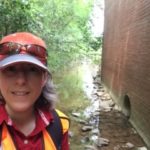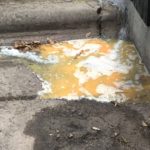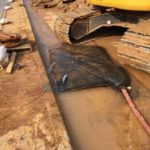Stormwater Management
NC State University Stormwater (MS4) Jurisdiction
NC State University has been issued a National Pollutant Discharge Elimination System (NPDES) Municipal Separate Storm Sewer System (MS4) Permit (NCS000376) by the North Carolina Department of Environmental Quality (NCDEQ) on behalf of the Environmental Protection Agency (EPA). Under this permit, responsibility is delegated to NC State University’s Environmental Health and Safety for review and approval of development plans for meeting Federal, State, and local stormwater management requirements.
The jurisdictional areas of this permit include North Campus, Central Campus, West Campus, South Campus, Centennial Campus, Centennial Biomedical Campus, and the Carter-Finley Stadium complex.
See NC State University’s published Stormwater GIS for the jurisdictional boundaries of our stormwater permit: Stormwater Viewer- https://go.ncsu.edu/ncstate-stormwater-viewer. Note that the “Stormwater MS4 area” must be selected in the Layer List by clicking on the eye to enable them:
What is stormwater?
Stormwater is rainwater or melted snow that runs off landscaped, paved, or other surfaces; it is commonly transported through municipal storm sewer systems and often discharged, untreated into local lakes and streams. Stormwater is a major pathway for pollutants (sediment, nutrients, fertilizers, pesticides, pet waste, oil, heavy metals, etc.) to enter the aquatic environment. These pollutants degrade water quality which harms aquatic organisms and restricts recreational activities (swimming, fishing, etc.).
How do we manage it?
Under the Federal National Pollutant Discharge Elimination System (NPDES) permit program, NC State University has a Municipal Separate Storm Sewer System (MS4) permit. The permit authorizes the University to discharge stormwater runoff to local streams and requires the University to develop a Stormwater Management Program. The primary components of the Stormwater Management Program include the following: Education and Outreach, Public Involvement and Participation, Illicit Discharge Detection and Elimination, Erosion and Sediment Control (ESC), Post-Construction Stormwater Management for New Development and Redevelopment, and Pollution Prevention and Good Housekeeping. Click on each program heading listed below for more information.
Education and Outreach
The goal of the program is to inform the campus population of local water quality issues and actions needed to minimize pollutants in stormwater runoff.
“Stormwater and You” pamphet

Resources:
Public Involvement and Participation
The goal of this program is to ensure that stakeholders from throughout the University have an opportunity to participate in the development and implementation of the University’s Stormwater Management Program. The University conducts quarterly Stormwater Management Advisory Committee (SMAC) meetings with a variety of stakeholders to evaluate the University’s Stormwater Management Program and discuss current challenges and opportunities. Students can get involved by participating in one or more of the environmental groups on campus such as: Sustainability Stewards, Environmental Student Association, or Zero Waste Wolves.
For more opportunities, visit the Get Involved at NC State website.
2024 Scheduled SMAC Meetings
- March 7th 9:45 AM
- May 30th 10 AM
- August 7th 2 PM
- November 6th 2:30 PM
Unless otherwise stated, all meetings will be held in the EHSC Training Room.

Illicit Discharge Detection and Elimination
The goal of this program is to prevent the discharge of contaminated stormwater runoff from University properties into the storm sewer system and local lakes and streams. The University’s program includes a minimum of semi-annual screening of all campus storm water outfalls. Additionally, University Facilities employees respond to reports of illicit discharges/spills on campus; they take all necessary actions to clean up the discharge/spill and complete source investigations and make any necessary repairs to prevent future illicit discharges. Call 919-515-3000 to report a discharge/spill to ground or surface waters on campus.


Erosion and Sediment Control Program (ESC)
The goal of this program is to prevent/minimize sediment loss from campus construction sites by reviewing proposed erosion and sediment control plans, providing recommendations for specific practices as needed, and conducting monthly inspections of each construction site to verify compliance with University ESC requirements.


Post-Construction Stormwater Management
The goal of this program is to minimize the adverse effects of development by implementing post-construction requirements to accomplish the following: minimize downstream flooding and erosion, remove pollutants (sediment, nutrients, bacteria, and heavy metals), and encourage infiltration of rainfall to replenish groundwater and maintain stable base flow in streams. The University’s program requires peak flow attenuation, runoff volume control, and nutrient management criteria to be addressed during the design phase of each project; most often these requirements are met by installing a stormwater control measure (SCM). The University maintains over 100 SCMs on campus; these include bioretention devices, stormwater wetlands, wet ponds, dry ponds, green roofs, grassed swales, level spreaders, and sand filters.

Pollution Prevention and Good Housekeeping
The goal of this program is to prevent or minimize stormwater pollution from University activities by implementing the following actions: employee education/training, preventative maintenance, visual inspections, waste management, recycling and solid waste reduction, pesticide/herbicide application management, hazardous waste management, parking lot maintenance, and stormwater infrastructure maintenance. These activities are carried out by University Facilities and Environmental Health and Safety Department employees on a daily basis.

